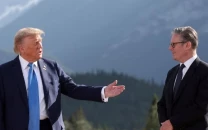China held rounds of Taliban talks: Afghanistan's Abdullah
Claims China asked Taliban leaders to talk directly with Afghan government

Afghanistan Chief Executive Officer Dr Abdullah Abdullah. PHOTO: AFP
The Chinese have held "one, two or three" rounds of talks with the Taliban in the past few months, Abdullah Abdullah said at a conference organised by an Indian media group.
"They asked the Taliban to have talks directly with the Afghan government, that's a good message," Abdullah said, adding that he did not know what the outcome would be of China's efforts.
Read: Afghan peace process: Kabul in ‘preliminary contact’ with Taliban
China's foreign minister last month said during a visit to Islamabad that Beijing was willing to help mediate talks to end the Afghan war, but Chinese officials have not provided many details. China's Foreign Ministry spokesperson Hong Lei said this week that reports its diplomats in Islamabad met last month with Taliban representatives "do not accord with reality".
Read: Wang Yi in Islamabad: Beijing offers to assist Afghan reconciliation
Abdullah, speaking at the India Today Conclave 2015 in New Delhi, did not say where the meetings took place. He said Afghanistan had begun to improve relations with China under the previous president, Hamid Karzai, with the idea that Beijing could use its influence over Pakistan to help broker peace talks.
China has close ties with Afghanistan's neighbour Pakistan, which is widely believed to exert considerable control over the group. But it remains to be seen whether China's intervention will have any impact.
In February, a Pakistani army delegation brought word to Afghanistan's President Ashraf Ghani that Taliban leaders had signalled they were willing to open talks, according to senior Pakistani and Afghan officials. Since then, senior representatives of the militant group have reportedly visited Islamabad where they were told to end a rift between two leaders that could undermine a peace process, two Taliban sources said.
Abdullah's backing of the nascent process to negotiate an end to the 13-year insurgency is crucial because many of his supporters represent the vehement anti-Taliban wing that fought against the hardline Islamists when they held power until 2001.



















COMMENTS
Comments are moderated and generally will be posted if they are on-topic and not abusive.
For more information, please see our Comments FAQ